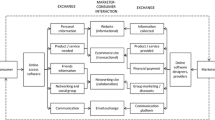Abstract
Along with an increasing sophistication of products, services and contents migrating to the digital space, the Social Web has revolutionized the architecture of social relationships. In a social networking environment, the traditional legal analysis is challenged by new behavioral patterns likely to evoke certain privacy concerns. On the one hand, users are actively involved in the provision of relevant information intended to fuel personalization strategies and recommender systems. Therefore, the recommending activity becomes decentralized and users go from passive observer to active recommendation provider. On the other hand, the intense participation in social networks represents an infinite source of valuable information. Since like-minded individuals assemble and share interests and preferences, regular and repetitive social patterns in searching, browsing, selecting or buying offer a wealth of (shared) data about users and represent a valuable source of information. Both assumptions, linked to the Social Web, call for exploring the need to redefine the legal approach to recommender systems under new coordinates.
This paper aims to examine the development of recommender systems, considering the new patterns of social behavior, and tackle the emerging legal concerns aroused by the collection and process of personal and social information and the legal consequences of devising a decentralized recommendation model. As a conclusion, a model likely to achieve a balance between privacy risks and personalization advantages is proposed. Service providers are encouraged to devise technical and organizational measures intended to minimize data collection and guarantee a free and well-informed user consent giving by implementing opt-out mechanisms and deploying ambitious transparency and disclosure policies, enabling individuals to build their digital ego on a sound consent-directed basis.
Access this chapter
Tax calculation will be finalised at checkout
Purchases are for personal use only
Preview
Unable to display preview. Download preview PDF.
Similar content being viewed by others
References
Anderson, D.S.: What trust is in these times? examining the foundation of online trust. Emory Law Journal 54(3), 1441–1474 (2005)
De Las Heras Ballell, T.R.: Legal framework for personalization-based business models. In: Personalization of Interactive Multimedia Services: A Research and Development Perspective, pp. 3–23. Nova Publisers (2009)
De Las Heras Ballell, T.R.: La migración digital. Telos. Cuadernos de Comunicación, Tecnología y Sociedad (61), 4–6 (2004)
De Las Heras Ballell, T.R.: Terms of use, browse–wrap agreements and technological architecture: spotting possible sources of unconscionability in the digital era. Contratto e Impresa. Europa 14(2), 849–869 (2009)
De Las Heras Ballell, T.R.: El tercero de confianza en el suministro de información. propuesta de un modelo contractual para la sociedad de la información. Anuario de Derecho Civil 63(3), 1245–1284 (2010)
De Las Heras Ballell, T.R.: Intermediación en la red y responsabilidad civil. Revista Española de Seguros 142, 217–259 (2010)
De Las Heras Ballell, T.R.: La responsabilidad de los prestadores de servicios de intermediación en la red. Revista Derecho y Tecnología 11, 69–96 (2010)
Felferning, A., Teppan, E.: User Acceptance of Knowledge-based Recommender. In: Personalization Techniques and Recommender Systems, vol. 70. World Scientific (2008)
Fernández, M.A., De las Heras Ballell, T.R.: Las agencias de ”raiting” como terceros de confianzaresponsabilidad civil extracontractual y protección de la seguridad del tráfico. Revista de derecho bancario y bursátil 29(120), 141–177 (2010)
Fernández, Y.B., Arias, J.J.P., Solla, A.G., Cabrer, M.R., Nores, M.L.: Personalization Strategies and Semantic Reasoning: Working in tandem in Advanced Recommender Systems. In: Personalization Techniques and Recommender Systems, vol. 70, pp. 191–222. World Scientific (2008)
Findlay, D.: Tag! now you’re really ”it” what photographs on social networking sites mean for the fourth amendment. North Carolina Journal of Law and Technology 10(1), 171–202 (2009)
Nelson, S., Simek, J., Foltin, J.: The legal implications of social networking. Regent University Law Review 22(1), 1–34 (2009-2010)
Frankel, T.: Trusting and non-trusting on the internet. Boston University Law Review 81, 457–458 (2001)
Michael Froomkin, A.: The essential role of trusted third parties in electronic commerce. Oregon Law Review 75, 49–116 (1996)
Garrie, D.B., Duffy-Lewis, M., Wong, R., Gillespie, R.L.: Data protecion: the challeges facing social networking. International Law and Management Review 6, 127–152 (2010)
Knobloch-Westerwick, S., Sharma, N., Hansen, D.L., Alter, S.: Impact of popularity indications on readers’ selective exposure to online news. Journal of Broadcasting and Electronic Media 49(3), 296–313 (2005)
Kraakman, R.H.: Gatekeepers: The anatomy of a third-party enforcement strateg. Journal of Law, Economics and Organization 2(1), 53–104 (1986)
Manns, J.D.: Rating risk after the subprime mortgage crisis: A user fee approach for rating agency accountability. North Carolina Law Review 87(1011), 1047–1056 (2009)
Minottie, K.: The advent of digital diaries: Implications of social networking sites for the legal profession. South Caroline Law Review 60, 1057–1064 (2008-2009)
Mitton, A.: Data protection and web 2.0: Whose data is it anyway? Convergence 3(1), 94–98 (2007)
Payne, A.C.: Twitigation: Old rules in a new world. Washburn Law Journal 49(3), 841–870 (2010)
Smyth, B.: Personalization-Privacy Trradeoffs in Adaptive Information Access. In: Personalization Techniques and Recommender Systems, vol. 70, pp. 3–31. World Scientific (2008)
Author information
Authors and Affiliations
Corresponding author
Rights and permissions
Copyright information
© 2012 Springer-Verlag Berlin Heidelberg
About this chapter
Cite this chapter
de las Heras Ballell, T.R. (2012). Legal Aspects of Recommender Systems in the Web 2.0: Trust, Liability and Social Networking. In: Recommender Systems for the Social Web. Intelligent Systems Reference Library, vol 32. Springer, Berlin, Heidelberg. https://doi.org/10.1007/978-3-642-25694-3_2
Download citation
DOI: https://doi.org/10.1007/978-3-642-25694-3_2
Published:
Publisher Name: Springer, Berlin, Heidelberg
Print ISBN: 978-3-642-25693-6
Online ISBN: 978-3-642-25694-3
eBook Packages: EngineeringEngineering (R0)




